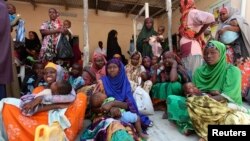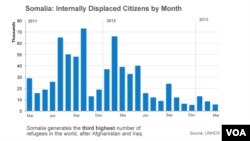Human Rights Watch is calling on the Somali government to better protect internally displaced persons living in the capital, Mogadishu, saying many face a "hostile and abusive environment."
In a report Wednesday, the group accuses militias and security forces of serious abuses, including rape, beatings, ethnic discrimination and restricting access to food and shelter.
The United Nations estimates up to 1.4 million people are displaced in Somalia, with about half now living around Mogadishu and areas to the south.
Human Rights Watch interviewed 70 new arrivals to camps in Mogadishu who fled there because of famine or fighting between July 2011 and last November.
It says the most threatening problem in the camps is sexual violence, with women and girls there facing a "significant risk of rape." Those incidents, the group says, often go unreported because victims fear retaliation and social stigma.
The issue gained international attention this year, when a Somali court convicted a woman who said she was raped by government soldiers while living in a displaced person's camp in Mogadishu. The court also convicted a journalist who interviewed the woman. Rights groups and media freedom organizations protested the convictions, calling the case politically motivated.
Somalia's Supreme Court released both the woman and the journalist last week, more than a month after they were sentenced to a year in prison.
U.N. Secretary-General Ban Ki-moon's report on Somalia to the Security Council in January said more than 800 rape cases were reported between September and November last year in and around Mogadishu. It said many of the victims were women and children in the camps, and that the issue required "urgent intervention" by the government.
The Human Rights Watch report also focuses on the managers of the camps, or what it calls "gatekeepers" who control resources and the movement of the people living there. The report accuses the gatekeepers and militia members of diverting or stealing food aid and threatening to confiscate tents provided by international organizations.
It says Somalia's former Transitional National Government did not hold abusive members of security forces and militias accountable, and was largely unable to fill a security vacuum left after al-Shabab militants were driven out of the city in 2011.
Last year, Ethiopian troops helped the Somali government and African Union forces further dislodge al-Shabab from its strongholds in central and southern Somalia.
Human Rights Watch says the improved security and easing of famine in Somalia provide an opportunity for greater access for the international community, and that donors need to stress the importance of accountability for serious rights abuses. It further challenges the new Somali government to show it can ensure the rights of its population, calling that an "important test of its credibility."
In January, President Hassan Sheikh Mohamud said the government will fight murder, rape and corruption, and will appropriately deal with soldiers who commit crimes.
Last month, the government announced the formation of a task force to investigate human rights abuses, including sexual violence against women. Prime Minister Abdi Farah Shirdon's office said the body will have three months to investigate what he called a "culture of impunity" in Somalia.
Before Mr. Mohamud took office in September, Somalia had not had a stable central government since warlords overthrew then-president Mohamed Siad Barre in 1991. The country endured 20 years of conflict and lawlessness until U.N.-backed efforts to form a new government succeeded last year.
In a report Wednesday, the group accuses militias and security forces of serious abuses, including rape, beatings, ethnic discrimination and restricting access to food and shelter.
The United Nations estimates up to 1.4 million people are displaced in Somalia, with about half now living around Mogadishu and areas to the south.
Human Rights Watch interviewed 70 new arrivals to camps in Mogadishu who fled there because of famine or fighting between July 2011 and last November.
It says the most threatening problem in the camps is sexual violence, with women and girls there facing a "significant risk of rape." Those incidents, the group says, often go unreported because victims fear retaliation and social stigma.
The issue gained international attention this year, when a Somali court convicted a woman who said she was raped by government soldiers while living in a displaced person's camp in Mogadishu. The court also convicted a journalist who interviewed the woman. Rights groups and media freedom organizations protested the convictions, calling the case politically motivated.
Somalia's Supreme Court released both the woman and the journalist last week, more than a month after they were sentenced to a year in prison.
U.N. Secretary-General Ban Ki-moon's report on Somalia to the Security Council in January said more than 800 rape cases were reported between September and November last year in and around Mogadishu. It said many of the victims were women and children in the camps, and that the issue required "urgent intervention" by the government.
The Human Rights Watch report also focuses on the managers of the camps, or what it calls "gatekeepers" who control resources and the movement of the people living there. The report accuses the gatekeepers and militia members of diverting or stealing food aid and threatening to confiscate tents provided by international organizations.
It says Somalia's former Transitional National Government did not hold abusive members of security forces and militias accountable, and was largely unable to fill a security vacuum left after al-Shabab militants were driven out of the city in 2011.
Last year, Ethiopian troops helped the Somali government and African Union forces further dislodge al-Shabab from its strongholds in central and southern Somalia.
Human Rights Watch says the improved security and easing of famine in Somalia provide an opportunity for greater access for the international community, and that donors need to stress the importance of accountability for serious rights abuses. It further challenges the new Somali government to show it can ensure the rights of its population, calling that an "important test of its credibility."
In January, President Hassan Sheikh Mohamud said the government will fight murder, rape and corruption, and will appropriately deal with soldiers who commit crimes.
Last month, the government announced the formation of a task force to investigate human rights abuses, including sexual violence against women. Prime Minister Abdi Farah Shirdon's office said the body will have three months to investigate what he called a "culture of impunity" in Somalia.
Before Mr. Mohamud took office in September, Somalia had not had a stable central government since warlords overthrew then-president Mohamed Siad Barre in 1991. The country endured 20 years of conflict and lawlessness until U.N.-backed efforts to form a new government succeeded last year.






